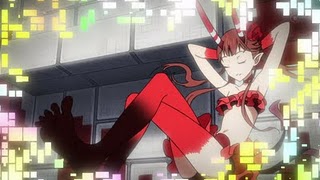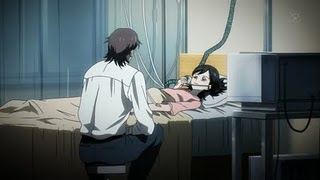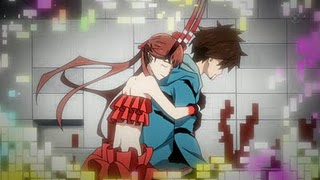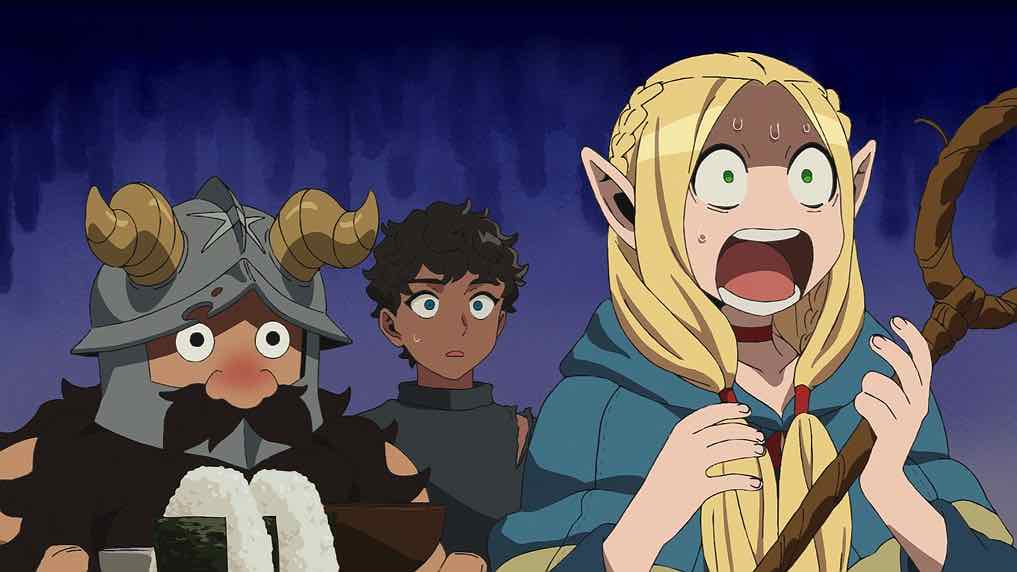I’ve already gone on ad nauseum about the interesting trend that seems to have developed with NoitaminA. Just about every season seems to have one heart-warming emotional series and one intellectual, sci-fi/fantasy based series. Every season has one show that attacks the problem of the 11-episode format with a targeted, disciplined plan and one that founder by trying to do far too much and ends up accomplishing far too little. It isn’t hard to guess where C falls this season.
Director Kenji Nakamura is an industry heavyweight, always capable of coming up with the big idea and an unsettling final product. The premise of this one had elements of Philip K. Dick – a kind of paranoid future world where a shadow society of high-rollers was toying with the fate of the world through secret financial dealings. Yes, the symbolism here is pretty easy to spot. It’s a good conceit, and it started out as something that was intellectually engaging, even if it struggled to connect emotionally.
 Unfortunately, things started to unravel somewhere around the midway point (along with the animation quality) and the show never really recovered. There certainly haven’t been many series about global economics and this one sparked a very interesting and lively discussion. The basic dilemma of the premise – mortgaging the future to stave off disaster in the present – is pretty thinly veiled political commentary, but at least it’s a statement, a representation of a belief in something. But it became clear that while this was a series that wanted to try and illuminate the dangers of the global debt economy, it didn’t really have any answers. After trying to set itself up as a serious social commentary, it resorted to a pretty standard series of devices to resolve the plot.
Unfortunately, things started to unravel somewhere around the midway point (along with the animation quality) and the show never really recovered. There certainly haven’t been many series about global economics and this one sparked a very interesting and lively discussion. The basic dilemma of the premise – mortgaging the future to stave off disaster in the present – is pretty thinly veiled political commentary, but at least it’s a statement, a representation of a belief in something. But it became clear that while this was a series that wanted to try and illuminate the dangers of the global debt economy, it didn’t really have any answers. After trying to set itself up as a serious social commentary, it resorted to a pretty standard series of devices to resolve the plot.
C also struggled to balance the character dynamics and the massively bloated amount of plot it burdened itself with. Individually several major character arcs were involving and interesting – Mikuni and his sister, Kimimaro’s teacher, everything involving Mashu. Kimimaro himself wasn’t especially engaging – more of a flat and inscrutable presence than anything else much of the time – but not so much of a liability that he was an anchor dragging the show down. But the uneven nature of the pacing and direction robbed these character arcs of some of the drama they might have had in a better series.
 The best thing about the show? Anything involving Mashu, as wonderfully portrayed by Haruka Tomatsu (who really shone this NoitaminA block). She was funny, cute, interesting and original. In fact, her impatience with Kimimaro and “get to the point” attitude sort of echoed my own frustrations with the show as a whole sometimes, almost as if she were speaking for me. In the end she too was denied a worthy conclusion – she got her open-mouth kiss, but her role above and beyond that of the asset was never really explained. OK, so she represented Kimimaro’s future – but how, exactly? What does that mean – was she his future daughter, wife? He was at his best when on-screen with her – they were a funny and liable couple. But the lack of real closure for them is just another frustration with this series.
The best thing about the show? Anything involving Mashu, as wonderfully portrayed by Haruka Tomatsu (who really shone this NoitaminA block). She was funny, cute, interesting and original. In fact, her impatience with Kimimaro and “get to the point” attitude sort of echoed my own frustrations with the show as a whole sometimes, almost as if she were speaking for me. In the end she too was denied a worthy conclusion – she got her open-mouth kiss, but her role above and beyond that of the asset was never really explained. OK, so she represented Kimimaro’s future – but how, exactly? What does that mean – was she his future daughter, wife? He was at his best when on-screen with her – they were a funny and liable couple. But the lack of real closure for them is just another frustration with this series.
Finally, I think C stands as a well-intentioned miss – a very good idea with mediocre execution. As with Frctale, the demands of the timeslot seemed to be too much for it despite the presence of an excellent director. It asked interesting questions, but didn’t really try to answer them. It hatched good character stories, but never found a way to weave them into a cohesive whole. It presented interesting and striking images, but but struggled with budgetary issues which led to spotty animation and short-cutting. I respect noble failures much more than unambitious ones, and I’m glad I watched the series. I just don’t think it will stand the test of time and emerge as a successful and important work.





